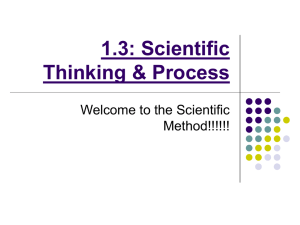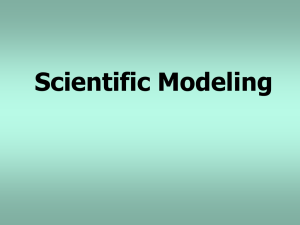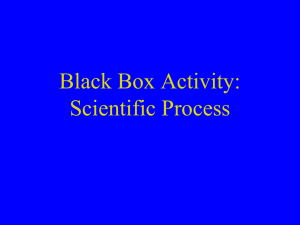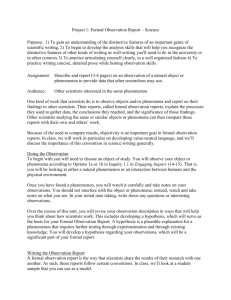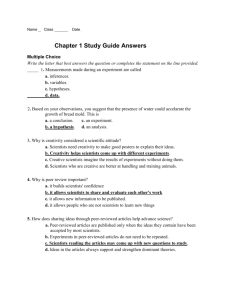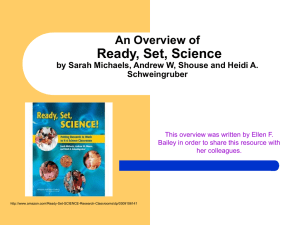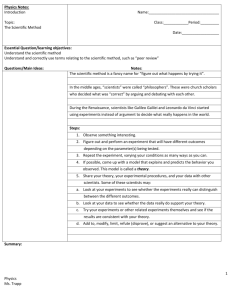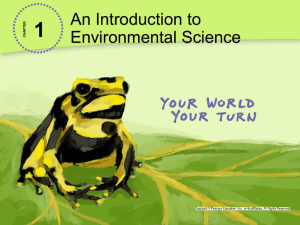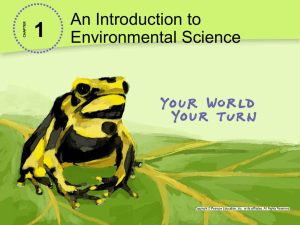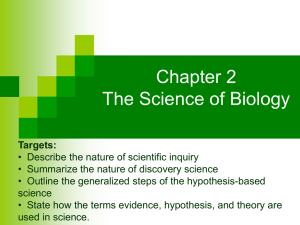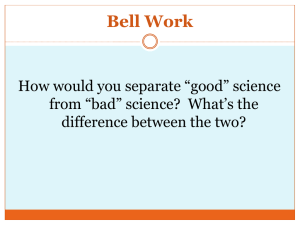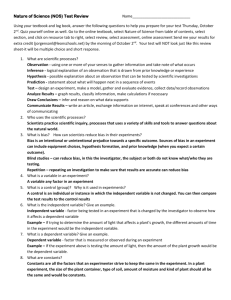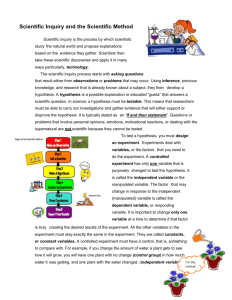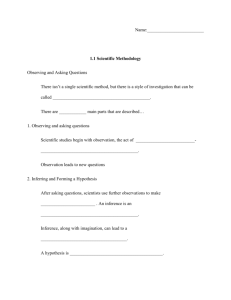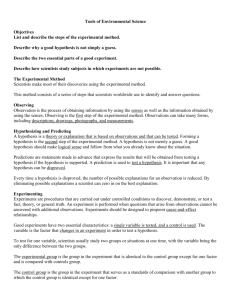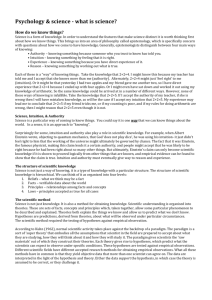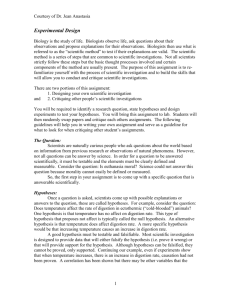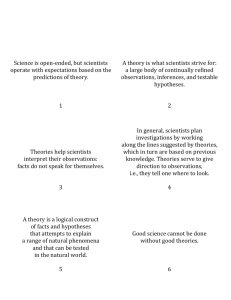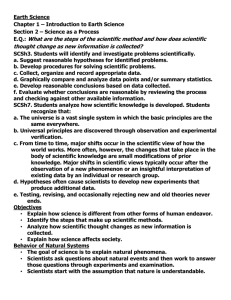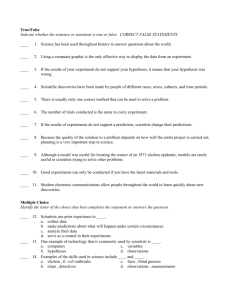1.3 Scientific Thinking and Processes
advertisement
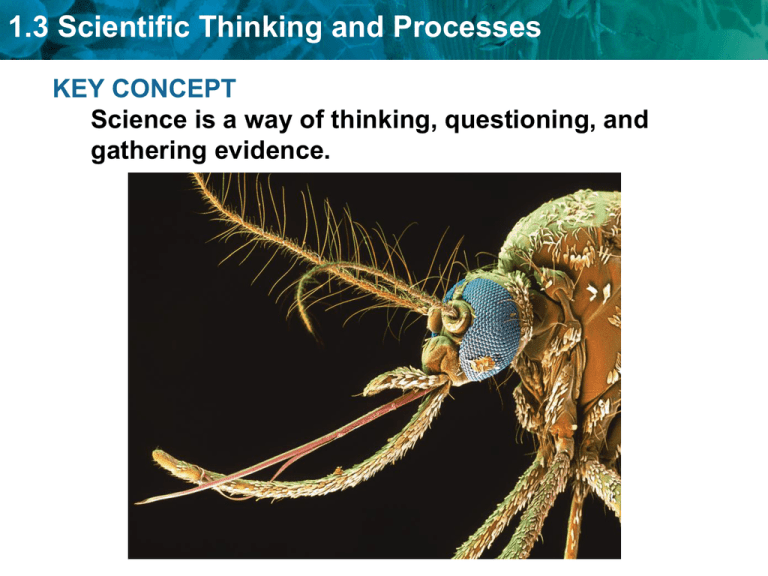
1.3 Scientific Thinking and Processes KEY CONCEPT Science is a way of thinking, questioning, and gathering evidence. 1.3 Scientific Thinking and Processes Biologists use experiments to test hypotheses. • Observational studies allow scientists to describe a phenomenon. 1.3 Scientific Thinking and Processes Observation • Begins all scientific inquiry – Uses senses, but also tools – Leads to scientific questions • Used to form hypothesis • Can be recorded as data – Qualitative or quantitative Qualitative Quantitative 1.3 Scientific Thinking and Processes Testing our observation skills • THE OBSERVATION BOX – You will have 1 minute to look into my box. – You may not touch any of the contents. – After the 1 minute, you will go back to your desk to record all of your observations. DO NOT share your notes with anyone else. – After everyone has viewed the contents in the box, you will be challenged to answer 15 questions based on your observations. 1.3 Scientific Thinking and Processes The Observation Box 1. What color were the sticky notes? 2. What color was the highlighter? 3. How many crayons are in the box of crayons? 4. What color was the key cover clip? 5. How many items that you observed were green? 6. What was the card game? 7. What brand was the tape? 8. How many items total did you observe? 1.3 Scientific Thinking and Processes 9. How many writing utensils did you observe? 10. What color was the paperclip? 11.Which items that you observed were made from wood? 12.How many expo markers were there? 13.How many items had a rectangular shape? 14.What item(s) was resting on the roll of tape? 15. What kind of gum did you observe? 1.3 Scientific Thinking and Processes Like all science, biology is a process of inquiry. • Scientists make careful and systematic observations. • Scientists record observations as data. • Scientists form a hypothesis as a possible answer to a question. • Scientists test their hypotheses and analyze their data. 1.3 Scientific Thinking and Processes • Where in the cycle would retesting a hypothesis take place? 1.3 Scientific Thinking and Processes Observation or Inference? • Observation is crucial in science. • Help describe and explain • Try not to infer, but experiment. – Inference= interpretation – Observation= detectable with senses or a tool 1.3 Scientific Thinking and Processes Real Apple VS Word APPLE Observation Inference 1.3 Scientific Thinking and Processes • Experimental studies allow scientists to determine what causes a phenomenon. • What about observational studies? – Ex. Studying migration patterns in white storks 1.3 Scientific Thinking and Processes Testing Hypotheses • Multiple trials needed – Improves accuracy – Reduces risk of error or chance 1.3 Scientific Thinking and Processes • Experimental studies allow scientists to determine what causes a phenomenon. – Independent variables are manipulated. – Dependent variables are observed and measured. – Constants are conditions that are kept the same. 1.3 Scientific Thinking and Processes Think it over… • How do experiments show cause and effect relationships? • Ex: If you were measuring the growth rate of trees receiving fertilizer applications compared to the growth rate of tree receiving no fertilizer applications, what would be the variables? • Independent variable=controlled variable fertilizer application. • dependent variable=responding variableTree growth rate 1.3 Scientific Thinking and Processes Analysis of Data and Evaluating Results • Statistical analysis of results – Nonsignificant (data show no effect, or so small it could have happened by chance) – Significant (data show an effect that is likely not due to chance) • Data doesn’t support the hypothesis? • Peer Review 1.3 Scientific Thinking and Processes A theory explains a wide range of observations. • Theories explain a wide range of observations and experimental results. • A theory is supported by a wide range of scientific evidence. • Theories can change based on new evidence. 1.3 Scientific Thinking and Processes A theory explains a wide range of observations. • Scientific Law – Describes a truth that is valid everywhere in the universe – Law of conservation of energy – Provides no explanation • Theories do not become laws 1.3 Scientific Thinking and Processes Self-Check 1. Which word best describes a scientific hypothesis? a. provable b. theoretical c. testable d. quantifiable 1.3 Scientific Thinking and Processes 2. At which stage of scientific inquiry would scientists find out if their hypotheses were supported by their data? a. observing b. testing hypotheses c. analyzing data d. evaluating results 1.3 Scientific Thinking and Processes 3. In an experiment, the condition that is manipulated by a scientist is the a. independent variable. b. dependent variable. c. constant. d. control condition. 1.3 Scientific Thinking and Processes 4. Which of the following is an important characteristic of a scientific theory? a. proven by more than one scientist b. unchanged by new evidence c. accepted by the public d. supported by much evidence 1.3 Scientific Thinking and Processes 5. One way in which experimental research differs from observational research is that only experimental research can a. test a hypothesis. b. produce scientific results. c. support a theory. d. show cause and effect.

